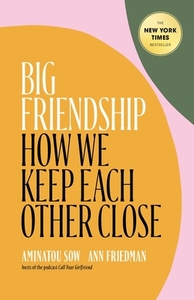You need to sign in or sign up before continuing.
Take a photo of a barcode or cover
emotional
reflective
slow-paced
hopeful
informative
inspiring
medium-paced
emotional
reflective
fast-paced
informative
reflective
medium-paced
emotional
hopeful
inspiring
reflective
medium-paced
What didn't work for me:
I loved the concept of this book but found the execution to be somewhat bland. It often felt like they were censoring themselves in order to be more politically correct, which made it hard to feel close to them. It also made it feel smug at times.
The authors decided to write in the third person, which was just awkward. Why not divide up anecdotes from each first-person point of view, then analyze the experience together? It would have made their personal experiences more compelling. Instead, it took me a month to get through the book because it was easy to put down.
Finally, their definitions of "big friendship" didn't really ring true for me. It's clear that they've grown apart over the years and currently have friends with whom they speak every day - and perhaps the only reason they still speak so frequently is because of their business together. This seems more like their definition of "reserve friendship." But, in a modern, mobile society, I believe that big friendships can persevere even if communication frequency ebbs and flows. Personally, since I've lived in so many places, I don't get to see or speak to many of my closest friends on a regular basis, but there are moments where we communicate intensely depending on what's going on with us. I don't think this makes them reserve friends.
What did work for me:
Loved the discussion of how social media makes us outside observers of our friends' lives. Also loved the discussion of biracial friendships. Shine Theory is great. The book made me want to call all of my closest friends.
I loved the concept of this book but found the execution to be somewhat bland. It often felt like they were censoring themselves in order to be more politically correct, which made it hard to feel close to them. It also made it feel smug at times.
The authors decided to write in the third person, which was just awkward. Why not divide up anecdotes from each first-person point of view, then analyze the experience together? It would have made their personal experiences more compelling. Instead, it took me a month to get through the book because it was easy to put down.
Finally, their definitions of "big friendship" didn't really ring true for me. It's clear that they've grown apart over the years and currently have friends with whom they speak every day - and perhaps the only reason they still speak so frequently is because of their business together. This seems more like their definition of "reserve friendship." But, in a modern, mobile society, I believe that big friendships can persevere even if communication frequency ebbs and flows. Personally, since I've lived in so many places, I don't get to see or speak to many of my closest friends on a regular basis, but there are moments where we communicate intensely depending on what's going on with us. I don't think this makes them reserve friends.
What did work for me:
Loved the discussion of how social media makes us outside observers of our friends' lives. Also loved the discussion of biracial friendships. Shine Theory is great. The book made me want to call all of my closest friends.
informative
reflective
medium-paced
informative
inspiring
reflective
medium-paced
informative
inspiring
reflective
fast-paced






